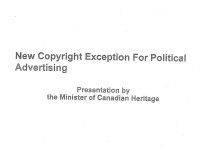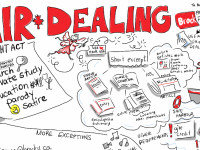Last night I posted on reports that the Canadian government is considering a new copyright exception for political advertising. While many have been harshly critical of the plans, I’ve noted that political speech is critically important and that copyright law should not be used to stifle it. My post argues that the law may already cover some of the uses and that if changes are needed, a better approach would be to adopt a fair use provision in Canada.
I have now obtained a copy of the document that was presented by the Minister of Canadian Heritage. The document is obviously consistent with the media reports, but provides significantly more detail and raises several additional questions and concerns.








